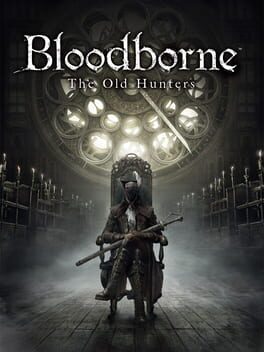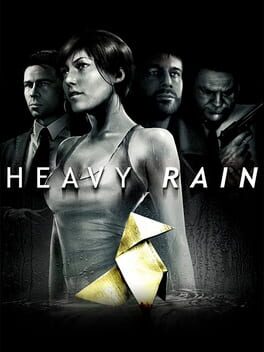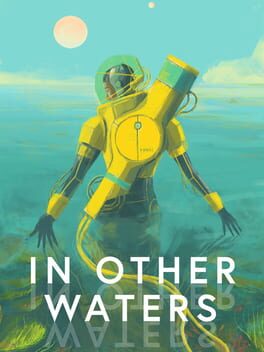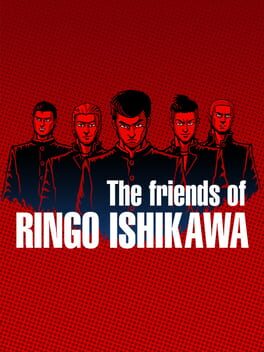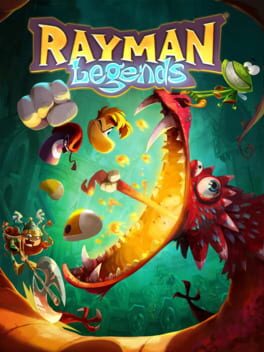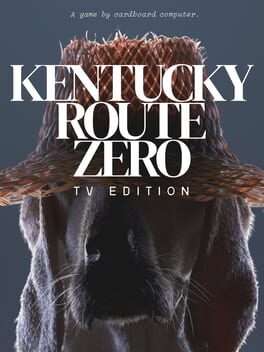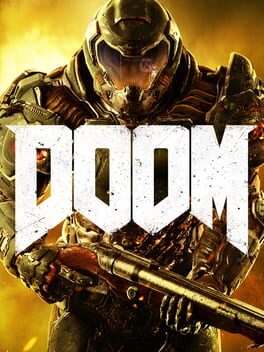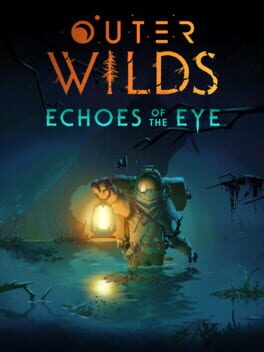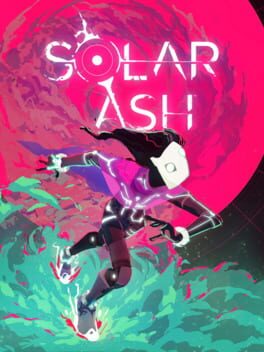chortles
2019
Outer Wilds is the only game I can think of where within its first moments, I knew I was in for something very, very special without really understanding why. The title screen is already so inviting, with its gentle acoustic glow fading in over a collage of shimmering stars. The game opens, I wake up on my back, looking up into the sky to see something explode in the distant orbit of a giant, green planet deep in space, and my imagination is immediately captured. I feel an intangible warmth as I speak to my fellow Hearthians and wander our village, a sense of wonder and anticipation as I walk through our peoples' museum, learning about things that I realize I will inevitably have to face or utilize in the adventures ahead. All this before even seeing my ship, let alone blasting off with it into the far reaches of space.
The expectations and tone of Outer Wilds are set up pitch perfectly in this opening. On the whole, the game captures the innate desire we all have to learn more, to reach out for what's next, even if we have no idea what it is we are searching for or why we seek it. It's the only thing Outer Wilds relies on to lead players forward. There are no objectives or goals, no waypoints to show you where to go next; there only those which you create for yourself. What drives us forward is the need to understand the world(s) around us, or at least attempt to understand. Is there a more human desire than that?
Outer Wilds is a masterpiece for its many balances: of warmth and intimacy with the melancholic loneliness of space; a constant sense of wonder with an equally constant fear of the unknown; its charming, colorful art style with its hard, scientific approach; its reverence for the teachings of both classical and quantum physics; its personal, micro-level character stories set against the fate of the universe. The list goes on. And that's without even mentioning the game's emotional linchpin: Andrew Prahlow's incredible score, a healthy mix of folk, ambient and post-rock that is a delicate tight-wire act in and of itself, managing to capture both the vastness of space and the intimate glow of a campfire without compromise.
Whatever feelings Outer Wilds brought out of me in its opening moments were only further heightened and more deeply understood as I began unraveling the mysteries of its clockwork solar system, spiraling faster and faster towards an ending that left me in awe of everything that came before it and soon yearning for other experiences that could fill the black hole that the game's sudden absence left in place of my heart. Outer Wilds is not only a perfect game, but also one of the medium's purest expressions of its most inspiring possibilities. If only I could breathe out a sigh of relief and wake up on Timber Hearth for the first time again.
The expectations and tone of Outer Wilds are set up pitch perfectly in this opening. On the whole, the game captures the innate desire we all have to learn more, to reach out for what's next, even if we have no idea what it is we are searching for or why we seek it. It's the only thing Outer Wilds relies on to lead players forward. There are no objectives or goals, no waypoints to show you where to go next; there only those which you create for yourself. What drives us forward is the need to understand the world(s) around us, or at least attempt to understand. Is there a more human desire than that?
Outer Wilds is a masterpiece for its many balances: of warmth and intimacy with the melancholic loneliness of space; a constant sense of wonder with an equally constant fear of the unknown; its charming, colorful art style with its hard, scientific approach; its reverence for the teachings of both classical and quantum physics; its personal, micro-level character stories set against the fate of the universe. The list goes on. And that's without even mentioning the game's emotional linchpin: Andrew Prahlow's incredible score, a healthy mix of folk, ambient and post-rock that is a delicate tight-wire act in and of itself, managing to capture both the vastness of space and the intimate glow of a campfire without compromise.
Whatever feelings Outer Wilds brought out of me in its opening moments were only further heightened and more deeply understood as I began unraveling the mysteries of its clockwork solar system, spiraling faster and faster towards an ending that left me in awe of everything that came before it and soon yearning for other experiences that could fill the black hole that the game's sudden absence left in place of my heart. Outer Wilds is not only a perfect game, but also one of the medium's purest expressions of its most inspiring possibilities. If only I could breathe out a sigh of relief and wake up on Timber Hearth for the first time again.
The Old Hunters offers such an essential link to its base game that after playing through a few times, it's hard to even distinguish them as separate products. Good DLC gives you more content to continue and improve upon the core experience, but great DLC does all that while deepening your understanding of and connection to the world that your character occupies. Bloodborne, in the tradition of From Software's approach to DLC, uses its additional content to flesh out its dense lore even further and, for those willing to decipher its disturbing mysteries, recontextualize events and characters at the heart of Bloodborne's story in captivating ways.
Plunged into The Hunter's Nightmare, you begin to make your way through a hellish inversion of an area you'll be familiar with from the base game: The Cathedral Ward. Standing in the place of its usual guardians though are dangerous, hostile hunters — those who have been cast down from the waking world into this sort of purgatory, likely for sins committed under Ludwig, the founder of the church hunters (and the first major boss you will take down in this area). As with many hunters, his intentions were good in the beginning, but as the scourge grew, he fell to the same bloodlust that took so many people and became an abhorrent beast…
It's easy to go and on and on about the immense lore implications revealed in The Old Hunters, but it unravels in such fascinating ways that are best left to be discovered firsthand. As side content that attempts to fill in some of Bloodborne's missing pieces (while introducing plenty of new questions of its own), it's fitting that The Old Hunters is defined by a sense of well-guarded secrecy. Even accessing the DLC is hidden away, found only by those who are specifically looking for it or by a lucky few who may stumble into it by accident. Further in, you meet Lady Maria, a person so key in shaping the events that take place in Bloodborne; she bemoans the hidden past you are uncovering, warning that "a corpse should be left well alone" and that she of all people knows "how the secrets beckon so sweetly." Director Hidetaka Miyazaki and his team are so good at creating intrigue through vague storytelling, never revealing concrete details and instead leaving us to reflect over characters' mysterious ruminations and their implications. Combined with this is typically impeccable environmental storytelling—their use of item descriptions, enemy design and placements, and level design to convey details of the world—with which From Software harnesses the unique qualities of games to give a confounding level of depth to their stories.
That is to say that the majority of this dense storytelling is naturally weaved into an actual game, and it's a damn good one at that. The Old Hunters offers an immensely challenging and atmospheric experience that rivals anything From Software have put out. The environments you traverse exude haunting beauty at every step, and the enemies you face are sublimely grotesque creations. Its levels are compelling as ever to explore (particularly the labyrinthine Research Hall, which is just a marvel of level design) and the boss fights are beyond incredible, pushing the players' skills to a level previously unseen in the base game and providing for moments of pure, unfettered adrenaline to take hold. If Bloodborne got anything right though, it was its dedication to its Victorian setting and the gnarly mix of Gothic and Lovecraftian horror that takes hold of it, all of which is translated in high form to its expansion.
All of this is simply to say that without The Old Hunters, there is no Bloodborne. Of course it exists and succeeds as a game on its own, but that The Old Hunters expands Bloodborne's already masterful game design with such exceptional, meaningful content makes the base game feel incomplete without it. Essential.
Plunged into The Hunter's Nightmare, you begin to make your way through a hellish inversion of an area you'll be familiar with from the base game: The Cathedral Ward. Standing in the place of its usual guardians though are dangerous, hostile hunters — those who have been cast down from the waking world into this sort of purgatory, likely for sins committed under Ludwig, the founder of the church hunters (and the first major boss you will take down in this area). As with many hunters, his intentions were good in the beginning, but as the scourge grew, he fell to the same bloodlust that took so many people and became an abhorrent beast…
It's easy to go and on and on about the immense lore implications revealed in The Old Hunters, but it unravels in such fascinating ways that are best left to be discovered firsthand. As side content that attempts to fill in some of Bloodborne's missing pieces (while introducing plenty of new questions of its own), it's fitting that The Old Hunters is defined by a sense of well-guarded secrecy. Even accessing the DLC is hidden away, found only by those who are specifically looking for it or by a lucky few who may stumble into it by accident. Further in, you meet Lady Maria, a person so key in shaping the events that take place in Bloodborne; she bemoans the hidden past you are uncovering, warning that "a corpse should be left well alone" and that she of all people knows "how the secrets beckon so sweetly." Director Hidetaka Miyazaki and his team are so good at creating intrigue through vague storytelling, never revealing concrete details and instead leaving us to reflect over characters' mysterious ruminations and their implications. Combined with this is typically impeccable environmental storytelling—their use of item descriptions, enemy design and placements, and level design to convey details of the world—with which From Software harnesses the unique qualities of games to give a confounding level of depth to their stories.
That is to say that the majority of this dense storytelling is naturally weaved into an actual game, and it's a damn good one at that. The Old Hunters offers an immensely challenging and atmospheric experience that rivals anything From Software have put out. The environments you traverse exude haunting beauty at every step, and the enemies you face are sublimely grotesque creations. Its levels are compelling as ever to explore (particularly the labyrinthine Research Hall, which is just a marvel of level design) and the boss fights are beyond incredible, pushing the players' skills to a level previously unseen in the base game and providing for moments of pure, unfettered adrenaline to take hold. If Bloodborne got anything right though, it was its dedication to its Victorian setting and the gnarly mix of Gothic and Lovecraftian horror that takes hold of it, all of which is translated in high form to its expansion.
All of this is simply to say that without The Old Hunters, there is no Bloodborne. Of course it exists and succeeds as a game on its own, but that The Old Hunters expands Bloodborne's already masterful game design with such exceptional, meaningful content makes the base game feel incomplete without it. Essential.
Like other From Software games, Sekiro is all ups and downs. It draws you in, breaks you down, forces you to play by its rules and, finally, teaches you to adapt and overcome. The level of satisfaction one can feel from doing so cannot be overstated—it's one aspect (among others) that hooks so many people while keeping just as many at arm's length.
In one sense, Sekiro is more of the same then—a precise, challenging third person action game that certainly keeps the intangible feel of a From Software game close to its heart—but makes plenty of departures, large and small. Speed and mobility are top priority here, with fluid movement, fast combat and the ability to jump and swing around large, open spaces with a nifty grappling hook. Streamlined stealth gameplay is sprinkled in to shake up your approach to combat encounters, while RPG elements have been largely stripped away to keep the focus on a very tightly defined type of action game. Health has been supplemented with Posture, an ingenious mechanic that forces the player to attack with relentless well-timed strikes and deflections in order to break an enemy's posture and land a killing blow. It's so, so smart, and translates beautifully in motion; many games have attempted to capture the back and forth thrill of a duel between masters of the sword, but to my mind, none have done so with nearly as much grace as Sekiro.
As I was attempting to overcome the massive hurdle that is Sekiro's last boss, a realization finally occurred to me that the joint effect of all these changes represents so much more than From Software just shaking up the formula. There is genuine evolution in the design of dynamic combat that can be traced here, not only for their brand of games but within the sphere of action games as a whole.
At that point, I must have been at least fifty attempts deep on Sword Saint Isshin, finally putting him on the ropes and feeling like the stronger contestant after being endlessly slapped around. I first improved by learning the attacks and movements of each phase and adapting my strategy accordingly. Nothing new there, but it is precisely when I started gaining the advantage that I realized how much my behavior was actively influencing the way the fight played out. See, in Dark Souls, you waited for openings, took advantage of them in that brief window and then went back on defense; in Sekiro, it's up to you to carve out those openings and exploit them, and the game's fights are superbly tuned around this conceit. Reactive vs proactive. It's a tune-up more than an overhaul to be sure, but the difference is deeply felt.
Isshin's second phase dominated me for a long time as he unleashed flurries of attacks that, in my panic, had me retreating and frantically attempting to parry at every moment, without the guts needed to pull off effective counterattacks. He exploited my timid behavior and punished me for it, never giving me space to recover in the midst of his endless attacks and pushing me to make mistakes. In this mode, it didn't take long for him to put me face first in the dirt with each attempt. What's incredible though was being able to create a reversal as I slowly gained confidence—at some point, I was able to start hammering him with quick, precise strikes, and witnessed his approach to the fight completely shift. He became overly reliant on a sweeping attack to fling himself backwards, giving him space to escape and defend himself as I laid on attack after attack, and—despite his ability to quickly take me down should I make a mistake—he seemed more frantic, and defensive than ever. He simply didn't have the chance to wear me down like before. I created the upper-hand for myself, and I could exploit his reactions to my aggressive attack pattern, just as he did to me.
And so finally, something seemingly insurmountable became attainable, understood. Shortly after, Isshin fell. "…well done, Sekiro." Bliss.
It's a little thing, this fluidity in the back and forth exchange between Isshin and myself, but it didn't feel little. It felt like a revelation. The beauty of this truly dynamic gameplay defines the essence of Sekiro for me, and this sequence of struggle, realization and triumph in its final moments is perhaps the purest way such an experience could be capped off.
In one sense, Sekiro is more of the same then—a precise, challenging third person action game that certainly keeps the intangible feel of a From Software game close to its heart—but makes plenty of departures, large and small. Speed and mobility are top priority here, with fluid movement, fast combat and the ability to jump and swing around large, open spaces with a nifty grappling hook. Streamlined stealth gameplay is sprinkled in to shake up your approach to combat encounters, while RPG elements have been largely stripped away to keep the focus on a very tightly defined type of action game. Health has been supplemented with Posture, an ingenious mechanic that forces the player to attack with relentless well-timed strikes and deflections in order to break an enemy's posture and land a killing blow. It's so, so smart, and translates beautifully in motion; many games have attempted to capture the back and forth thrill of a duel between masters of the sword, but to my mind, none have done so with nearly as much grace as Sekiro.
As I was attempting to overcome the massive hurdle that is Sekiro's last boss, a realization finally occurred to me that the joint effect of all these changes represents so much more than From Software just shaking up the formula. There is genuine evolution in the design of dynamic combat that can be traced here, not only for their brand of games but within the sphere of action games as a whole.
At that point, I must have been at least fifty attempts deep on Sword Saint Isshin, finally putting him on the ropes and feeling like the stronger contestant after being endlessly slapped around. I first improved by learning the attacks and movements of each phase and adapting my strategy accordingly. Nothing new there, but it is precisely when I started gaining the advantage that I realized how much my behavior was actively influencing the way the fight played out. See, in Dark Souls, you waited for openings, took advantage of them in that brief window and then went back on defense; in Sekiro, it's up to you to carve out those openings and exploit them, and the game's fights are superbly tuned around this conceit. Reactive vs proactive. It's a tune-up more than an overhaul to be sure, but the difference is deeply felt.
Isshin's second phase dominated me for a long time as he unleashed flurries of attacks that, in my panic, had me retreating and frantically attempting to parry at every moment, without the guts needed to pull off effective counterattacks. He exploited my timid behavior and punished me for it, never giving me space to recover in the midst of his endless attacks and pushing me to make mistakes. In this mode, it didn't take long for him to put me face first in the dirt with each attempt. What's incredible though was being able to create a reversal as I slowly gained confidence—at some point, I was able to start hammering him with quick, precise strikes, and witnessed his approach to the fight completely shift. He became overly reliant on a sweeping attack to fling himself backwards, giving him space to escape and defend himself as I laid on attack after attack, and—despite his ability to quickly take me down should I make a mistake—he seemed more frantic, and defensive than ever. He simply didn't have the chance to wear me down like before. I created the upper-hand for myself, and I could exploit his reactions to my aggressive attack pattern, just as he did to me.
And so finally, something seemingly insurmountable became attainable, understood. Shortly after, Isshin fell. "…well done, Sekiro." Bliss.
It's a little thing, this fluidity in the back and forth exchange between Isshin and myself, but it didn't feel little. It felt like a revelation. The beauty of this truly dynamic gameplay defines the essence of Sekiro for me, and this sequence of struggle, realization and triumph in its final moments is perhaps the purest way such an experience could be capped off.
continually bowled over by this game into NG+. how humbling it is to realize that I was basically just Not Good until Isshin forced me to truly start learning the game at the end of my first run, and that it would not be until my second rodeo that I could actually begin to apply that burgeoning mastery and deepen my understanding of how the game works. I'm sure many will lament the lack of character builds that made the Souls series so easy to return multiple times, but I found the additional bandwidth to explore the many different shinobi arts and prosthetics deeply enriched my experience, creating a wealth of approaches to combat scenarios that I had previously only tackled in ways that fit my comfort zone.
I feel I can say with more conviction now that this is one of the greatest action games of all time, and one that boasts what is perhaps the best, most finely tuned combat system in any game. just impeccable on all fronts.
I feel I can say with more conviction now that this is one of the greatest action games of all time, and one that boasts what is perhaps the best, most finely tuned combat system in any game. just impeccable on all fronts.
2010
2020
This review contains spoilers
This is a great game until the narrative shifts and you start playing as Abby.
Then it becomes exceptional.
It comes at a point when Ellie’s story began to exhaust me (surely by design), as I watched her fall further and further yet into senseless, depraved acts of vengeance. In contrast, Abby has already commited her own heinous act from the outset, and we’re left to see her try to pick up the pieces. If Ellie’s is a story of losing her humanity, Abby’s is one of trying to regain it.
Naughty Dog is challenging us to hate a character we are supposed to love and love a character we are supposed to hate, and largely succeeds in doing so. Ellie is a hollowed shell of a person, a young woman traumatized by a collection of terrible experiences and even more so by the erosion of her trust in Joel, the one person in the world who had her back through the worst of times. When this sequel was announced, many (myself included) wondered how Naughty Dog would manage to carry on from the pitch perfect ending they had already achieved – from all the emotional complexity created by a lie, all the ambiguity captured in a single look. It’s amazing to see that this a true Part II in the sense that it continues exploring every implication left in the first game’s wake, the ripple effect of which is felt throughout the game and deepened by an ambitious, fractured narrative structure and healthy use of flashback, which gradually fill in our gaps and slowly build the story’s emotional core to an astounding degree.
This is not a perfect game, and even one where I was keenly aware of its flaws as I was playing. The difference is that they became less and less important as I began to see the complex tapestry that Naughty Dog has weaved here, less consequential in the grand scheme of what this game accomplishes. I just think it’s so rare for a AAA game to take such risks with its narrative as this does, and to pull it off at such a level of quality from almost every angle–acting, animation, direction, sound design and so on–is unbelievable.
Never in a thousand years would I have thought this is the sequel we'd get, and I love it for everything it has to offer. Warts and all.
Then it becomes exceptional.
It comes at a point when Ellie’s story began to exhaust me (surely by design), as I watched her fall further and further yet into senseless, depraved acts of vengeance. In contrast, Abby has already commited her own heinous act from the outset, and we’re left to see her try to pick up the pieces. If Ellie’s is a story of losing her humanity, Abby’s is one of trying to regain it.
Naughty Dog is challenging us to hate a character we are supposed to love and love a character we are supposed to hate, and largely succeeds in doing so. Ellie is a hollowed shell of a person, a young woman traumatized by a collection of terrible experiences and even more so by the erosion of her trust in Joel, the one person in the world who had her back through the worst of times. When this sequel was announced, many (myself included) wondered how Naughty Dog would manage to carry on from the pitch perfect ending they had already achieved – from all the emotional complexity created by a lie, all the ambiguity captured in a single look. It’s amazing to see that this a true Part II in the sense that it continues exploring every implication left in the first game’s wake, the ripple effect of which is felt throughout the game and deepened by an ambitious, fractured narrative structure and healthy use of flashback, which gradually fill in our gaps and slowly build the story’s emotional core to an astounding degree.
This is not a perfect game, and even one where I was keenly aware of its flaws as I was playing. The difference is that they became less and less important as I began to see the complex tapestry that Naughty Dog has weaved here, less consequential in the grand scheme of what this game accomplishes. I just think it’s so rare for a AAA game to take such risks with its narrative as this does, and to pull it off at such a level of quality from almost every angle–acting, animation, direction, sound design and so on–is unbelievable.
Never in a thousand years would I have thought this is the sequel we'd get, and I love it for everything it has to offer. Warts and all.
The rare game in which its greatest strength—seamless coherence of gameplay and theme—is also its Achilles' heel. For a game which aims to capture the ennui most of us feel at some point in our formative teenage years, it's refreshing to witness just how fully it commits to that vision. You'll wander around listlessly after school, looking for anything to occupy your time, get in fights with kids from rival schools and have life chats with your boys, all while trying to keep on the straight and narrow as you finish out your last semester of high school. What could be better?
Many of those elements automatically trigger my brain's pleasure center—and they're even propped up to the next level by some seriously strong writing and fantastic lo-fi aesthetics—but as a whole, it just feels a bit too aimless for me to fully embrace. The vibes alone would be enough to carry most people through this game for awhile (make no mistake: this thing VIBES for days), but I think the story is missing just that tiny bit of propulsion needed to make the day-to-day feel less like a chore. My last week (in game time) before putting it down really started to feel like I was going through the motions; not even playing anymore, just doing the things Ringo should be doing day-in, day-out, waiting for something to happen. But nothing did. Brilliant realization of its themes or just flawed game design? You tell me.
I hope Yeo doesn't stop making games though. There are (rightfully) so many people that love the unique flavor of The friends of Ringo Ishikawa, and I wish all of its ambitious pieces clicked into place more smoothly for me. I may not have felt fully satisfied by it, but it did refresh me in ways I couldn't have expected.
Many of those elements automatically trigger my brain's pleasure center—and they're even propped up to the next level by some seriously strong writing and fantastic lo-fi aesthetics—but as a whole, it just feels a bit too aimless for me to fully embrace. The vibes alone would be enough to carry most people through this game for awhile (make no mistake: this thing VIBES for days), but I think the story is missing just that tiny bit of propulsion needed to make the day-to-day feel less like a chore. My last week (in game time) before putting it down really started to feel like I was going through the motions; not even playing anymore, just doing the things Ringo should be doing day-in, day-out, waiting for something to happen. But nothing did. Brilliant realization of its themes or just flawed game design? You tell me.
I hope Yeo doesn't stop making games though. There are (rightfully) so many people that love the unique flavor of The friends of Ringo Ishikawa, and I wish all of its ambitious pieces clicked into place more smoothly for me. I may not have felt fully satisfied by it, but it did refresh me in ways I couldn't have expected.
2013
Not as precise a platformer as your Super Meat Boys or Celestes, but it doesn't need to be; Rayman Legends ignores the focus that subset of the genre places on mastering air-tight core mechanics in favor of having players grapple with the vast array of gameplay ideas thrown at the wall at any given moment through varied, imaginative level design. The sheer number of micro mechanics created this way, which in some cases are already left behind after one or two levels to move on to the next idea, is honestly staggering and gives the game a fresh, ever changing quality throughout that is difficult to rival.
A delight to play through, and that feeling is captured no better than by the sublime music levels that close out each world. These aren't just celebrations of your own achievements in the game, they're celebrations of the unadulterated joy that platformers—or any game, really—can bring us in those rare moments where everything locks into place and feels just right.
A delight to play through, and that feeling is captured no better than by the sublime music levels that close out each world. These aren't just celebrations of your own achievements in the game, they're celebrations of the unadulterated joy that platformers—or any game, really—can bring us in those rare moments where everything locks into place and feels just right.
2015
Yakuza 0 made me believe in the power of story driven, dialogue heavy games again. I can't remember the last time I found a game with 'traditional' storytelling (read: one which emulates film) so riveting from start to finish, and so cleverly conceived and arranged at that. A key to that is its great , personable writing, of course, but with this many cutscenes (+ the more frequent, less animated dialogue scenes) it helps that they're actually directed in some meaningful way, always finding interesting shots or camera moves to portray a scene, or zooming in perfectly to amplify its most comedic moments. A small thing, but we're always engaged because of it.
Yakuza 0 would already be an amazing game for that alone, and that's without even mentioning the other couple of games that happen to be crammed in there too, some being the most delightful of surprises (Cabaret Czar stans, hello); or its world, ready-made to woo you with its charm and personality, and inexplicably suck away hours on end; or its tonal mastery, oscillating between compelling melodrama and absurd comedy seamlessly.
It's all here, fellas. A game for the ages.
Yakuza 0 would already be an amazing game for that alone, and that's without even mentioning the other couple of games that happen to be crammed in there too, some being the most delightful of surprises (Cabaret Czar stans, hello); or its world, ready-made to woo you with its charm and personality, and inexplicably suck away hours on end; or its tonal mastery, oscillating between compelling melodrama and absurd comedy seamlessly.
It's all here, fellas. A game for the ages.
What impresses me most about Kentucky Route Zero is that despite how liberally it borrows many of its best traits from other mediums, it so clearly could only work as a game. In most games, the camera is an object to manipulate and control, a tool to serve the gameplay above all else. KRZ's use of camera takes more cues from films and cinematic technique than the vast majority of its counterparts, where its slow pans, layered zooms and stark scene transitions are calculated, artistic choices, left out of the players' hands and implemented to elicit specific emotional responses or entrench us deeper in the thick atmosphere of its world. The writing is at a strong literary level which doesn't overcome, but is simply not even concerned with the trap many games fall into of using dialogue as exposition crutches to push their stories further. Plot is secondary to mood and atmosphere in the story of KRZ, with its writers placing all focus on novelistic passages that emphasize detail and imagery, meshing well with the mysterious, unexplainable happenings in the world that are presented audiovisually.
What makes it so vital as specifically a game though? Not an easy question to answer, and KRZ is so elusive and oblique that I imagine it means a lot of things to a lot of people. To me, it's about a few key choices related to interaction—the way you occupy multiple characters, write your own story with well-constructed dialogue choices (another subversion here in that again, this informs the way the story feels moment to moment, rather than giving us any actual agency over how it plays out) and immerses you into its most surreal qualities. There's a wonderfully dense thematic tapestry that is carefully weaved throughout the five acts as well; the throughline that sticks out most as I write this is the lack of control we have over our lives and our situations, the way we don't understand so many things swirling around us, beyond us, but often just accept what we're given with a sigh, moving forward, not looking back. Aren't games, at their most basic level, ultimately about control and pushing forward to what lies ahead?
What makes it so vital as specifically a game though? Not an easy question to answer, and KRZ is so elusive and oblique that I imagine it means a lot of things to a lot of people. To me, it's about a few key choices related to interaction—the way you occupy multiple characters, write your own story with well-constructed dialogue choices (another subversion here in that again, this informs the way the story feels moment to moment, rather than giving us any actual agency over how it plays out) and immerses you into its most surreal qualities. There's a wonderfully dense thematic tapestry that is carefully weaved throughout the five acts as well; the throughline that sticks out most as I write this is the lack of control we have over our lives and our situations, the way we don't understand so many things swirling around us, beyond us, but often just accept what we're given with a sigh, moving forward, not looking back. Aren't games, at their most basic level, ultimately about control and pushing forward to what lies ahead?
2016
I think too much. This has been the case for as long as I can remember, an unfortunate lifelong trait that fuels the train of thought endlessly careening around my head. As a working adult, playing games offers a much needed respite from the stresses and worries of the outside world, but it only does so for as long as it can hold my attention and keep extraneous thoughts from dominating my headspace.
For me then, one of the more infuriating signifiers of the modern AAA climate is a tendency of developers to intermittently take control away from the player. There's perhaps nothing more effective at breaking up a game's flow or your immersion in it than the 20th tutorial tip or an ill-timed cutscene that halts any sense of momentum; when these crop up, my focus is instantly shattered and my thoughts drift from what's on screen to what I should make for dinner, or my dog's vet appointment, or Trump's handling of the coronavirus outbreak… and so on. From this frustration I've at least gained a greater appreciation for games that don't put up any barriers preventing you from just jumping head first into the experience and making it your own.
One of Doom's defining qualities is that it mostly sets aside this form of videogame baggage—literalized in an early scene in which Doom Guy violently pushes aside a monitor that someone is spouting needless exposition from—which is honestly its own form of catharsis for me.
It becomes clear shortly after that it's all about the gameplay: a high-octane shooter in which you wield an unholy barrage of heavy weaponry to disembowel score after score of demons as you attempt to keep separate the world of living and that of hell. Or something like that—I mean does it really matter?
I've drifted away from first-person shooters as I've gotten older and many of them have similar struggles to retain my attention—too much time spent crouching behind cover, lining up the perfect shot, listening to mission briefings and so on. There's a stripped back approach to Doom which circumvents these issues, with each combat encounter providing escalating doses of adrenaline that will have you bouncing around arenas and blasting demons away without second thought. This is perhaps its most valuable asset—the speed and intensity with which fights are carried out means the only option for me is to turn big brain off and let pure instinct take over. I can't think too much or get distracted when I play Doom. I just play.
Beyond the simple beauty of that, I was taken with how many smaller pieces of the game deftly lock into place to bolster that fantastic gameplay loop. The pacing is well-tuned, as periods of traversal and optional exploration provide respite after hectic combat scenarios. Upgrades to your arsenal are surprisingly meaningful and inform the way you play the game, as you begin to intuit how certain weapons and power-ups play to your advantage against different enemy types. On top of it all is Mick Gordon's heavy metal score that gives Doom its juice (surprise bonus points go to the bits of spacey ambient that delicately underscore some quieter moments).
With the number of sequels and reboots that exist in the industry, it's refreshing to see one with an obvious level of care put behind it. While Doom is not flawless—even while the combat mostly thrilled me throughout, after some time it doesn't feel like there are any more surprises left and some fatigue can set in, among other minor quibbles—my complaints pale in comparison to how much of a pure joy the majority of the game is to experience, a callback to time of the original Doom, when fun was always at the forefront of games. I wish more developers would remember the simple power of that these days.
For me then, one of the more infuriating signifiers of the modern AAA climate is a tendency of developers to intermittently take control away from the player. There's perhaps nothing more effective at breaking up a game's flow or your immersion in it than the 20th tutorial tip or an ill-timed cutscene that halts any sense of momentum; when these crop up, my focus is instantly shattered and my thoughts drift from what's on screen to what I should make for dinner, or my dog's vet appointment, or Trump's handling of the coronavirus outbreak… and so on. From this frustration I've at least gained a greater appreciation for games that don't put up any barriers preventing you from just jumping head first into the experience and making it your own.
One of Doom's defining qualities is that it mostly sets aside this form of videogame baggage—literalized in an early scene in which Doom Guy violently pushes aside a monitor that someone is spouting needless exposition from—which is honestly its own form of catharsis for me.
It becomes clear shortly after that it's all about the gameplay: a high-octane shooter in which you wield an unholy barrage of heavy weaponry to disembowel score after score of demons as you attempt to keep separate the world of living and that of hell. Or something like that—I mean does it really matter?
I've drifted away from first-person shooters as I've gotten older and many of them have similar struggles to retain my attention—too much time spent crouching behind cover, lining up the perfect shot, listening to mission briefings and so on. There's a stripped back approach to Doom which circumvents these issues, with each combat encounter providing escalating doses of adrenaline that will have you bouncing around arenas and blasting demons away without second thought. This is perhaps its most valuable asset—the speed and intensity with which fights are carried out means the only option for me is to turn big brain off and let pure instinct take over. I can't think too much or get distracted when I play Doom. I just play.
Beyond the simple beauty of that, I was taken with how many smaller pieces of the game deftly lock into place to bolster that fantastic gameplay loop. The pacing is well-tuned, as periods of traversal and optional exploration provide respite after hectic combat scenarios. Upgrades to your arsenal are surprisingly meaningful and inform the way you play the game, as you begin to intuit how certain weapons and power-ups play to your advantage against different enemy types. On top of it all is Mick Gordon's heavy metal score that gives Doom its juice (surprise bonus points go to the bits of spacey ambient that delicately underscore some quieter moments).
With the number of sequels and reboots that exist in the industry, it's refreshing to see one with an obvious level of care put behind it. While Doom is not flawless—even while the combat mostly thrilled me throughout, after some time it doesn't feel like there are any more surprises left and some fatigue can set in, among other minor quibbles—my complaints pale in comparison to how much of a pure joy the majority of the game is to experience, a callback to time of the original Doom, when fun was always at the forefront of games. I wish more developers would remember the simple power of that these days.
This review contains spoilers
Floored by this. That the devs were able to create a whole new (enormous) location to explore, a new mythos, new mechanics, and a new air of mysticism while managing to slot it so neatly into the base game's unbelievably tight framework and lore is to be celebrated.. if not expected. This is Mobius after all.
So many gasp worthy moments that hit completely differently than the base game. Finding the ring world. The dam bursting. All those secret passages. The dream world, the slide reels, the vault. The prisoner. But for all those and everything else that feels fresh here, Echoes of the Eye still feels like Outer Wilds at every turn — its essence abstracted, distorted, but fully intact.
A one of a kind experience made even more special. I couldn't have asked for anything more.
So many gasp worthy moments that hit completely differently than the base game. Finding the ring world. The dam bursting. All those secret passages. The dream world, the slide reels, the vault. The prisoner. But for all those and everything else that feels fresh here, Echoes of the Eye still feels like Outer Wilds at every turn — its essence abstracted, distorted, but fully intact.
A one of a kind experience made even more special. I couldn't have asked for anything more.
2021
A truly interesting and unexpected follow up to Hyper Light Drifter that has glimmers of being just as special, if only it didn't manage to get in its own way. This comes through narratively and mechanically, where seemingly every written word further drains the mystique inherent in the stunningly rendered pastel cloudscape Heart Machine have assembled; one that feels so wonderfully smooth to glide through, soaring over its clouds, grinding rails across its aerial landscapes... until it suddenly doesn't, and your momentum breaks at the most jarring of times. Ambitious game for sure, and you can feel that shine through in its best moments, but as a package it falls just short of cohering into something more.
2015

